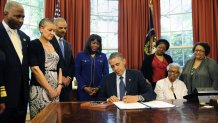For the entire month of February, NBC will showcase essays about Black Americans who pioneered change in United States history during the Civil Rights Movement that led to nationwide desegregation. Pioneers include those who led local efforts to desegregate schools, professionals who forged ahead to become luminaries within their industries, and advocates who stoked the wave of change head-on in the nation's bid for racial justice and equality.
U.S. Rep Terri Sewell, D-Alabama

I know that the journey I'm now on was only made possible because others made those sacrifices and took a journey.
Rep. Terri Sewell, D-Alabama
U.S. Rep. Terri Sewell, the first Black woman elected to Alabama’s congressional delegation, reminds herself daily that her personal success is not her birthright; rather, that it was made possible only as a result of the blood, sweat and tears poured out by the women, men and children who came before her.
Sewell represents Alabama’s 7th Congressional District, the focal point of numerous notable civil rights events in the 1960s. She thinks often about a tragedy that occurred just two years before her birth.
It was Sunday morning, Sept. 15, 1963, a day that began like any other for parishioners of Birmingham’s 16th Street Baptist Church. It was the city’s largest Black parish, and a hub of civil rights activism where leaders like Martin Luther King Jr. and Fred Shuttlesworth rallied the community. On this particular morning, 400 congregants had gathered to attend service.
Shortly before 10:30 a.m., a box containing more than a dozen sticks of dynamite detonated beneath the church steps. Twenty-two churchgoers were wounded, but most poignantly, the lives of four young girls attending Sunday school were cut short.

The murder of Addie Mae Collins, Denise McNair, Carole Robertson and Cynthia Wesley, aged 11 to 14, shook the nation. But it wasn’t until 2013 — 50 years after the Ku Klux Klan bombing — that the victims were officially acknowledged for their sacrifice with what Sewell described as, "the highest civilian honor that Congress can bestow upon anyone."
Sewell was the sponsor of a bill that posthumously awarded a Congressional Gold Medal to the girls, an action that came as the result of a sense of personal duty.
"I am a direct beneficiary of the [civil rights] movement. I know that I drink deep from wells that I did not dig," Sewell said. "I get to walk the halls of Congress today, because Addie Mae, Denise, Carole and Cynthia cannot [...] I walk in their shoes."
"The four little girls are a symbolic representation — an embodiment — of the promise of America, and their loss of life is a lost opportunity. [...] We, who have been beneficiaries, must make every effort to live up to the promise that their loss of life symbolizes."

Since becoming a congresswoman, Sewell has sought to make good on that promise, dedicating herself to elevating public awareness of the four Birmingham girls and other pioneers and milestones that helped forge new achievements in civil rights.
The year 2020 marked the 55th anniversary of "Bloody Sunday," a day of violence in which peaceful marchers were assaulted on their journey from Selma to Montgomery, Alabama. They marched in defiance of the policies that kept them separate, but not necessarily equal, and above all else, protested for their right to vote.
Sewell again worked to honor those who opened doors for future generations of people of color. She mobilized fellow lawmakers and secured unanimous passage of a bill to award a Congressional Gold Medal to the "foot soldiers" who "were so brave to be brutally beaten on the Edmund Pettus Bridge."
"We have to find strength in the fact that there were, in a generation ahead of us, folks that didn’t just complain, but they … nonviolently organized and protested. [...] It’s a testament to the enduring nature of our American values that are so enshrined in the Constitution," Sewell said.
It is the persistence and sacrifice of Selma’s marchers and Birmingham’s four young "heroines," Sewell said, that make it possible for her to hold the keys to an office on Capitol Hill.
She contemplates that reality each day, and is encouraged and committed to ensuring that yesterday’s sacrifices continue to create new opportunities for tomorrow’s youth: "We cannot rest on our laurels. We have to build upon [the sacrifices of others] and run our leg of the race with as much gusto ... empowered and emblazoned by the fortitude and bravery of those that came before us."
We cannot rest on our laurels. We have to build upon [the sacrifices of others] and run our leg of the race with as much gusto... empowered and emblazoned by the fortitude and bravery of those that came before us.
Rep. Terri Sewell, D-Alabama
Comcast NBCUniversal’s Voices of the Civil Rights Movement platform honors the legacy and impact of America’s civil rights champions. Watch more than 17 hours of firsthand accounts and historical moments, online and on Xfinity On Demand.
Content owned and funded by Comcast NBCUniversal, parent company of this station.

